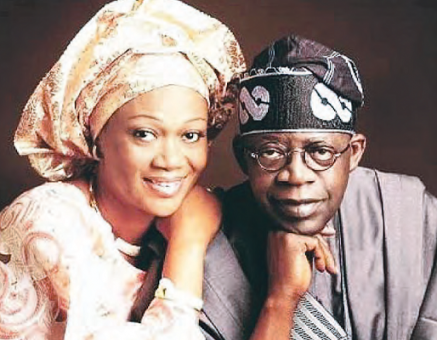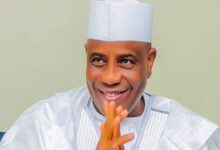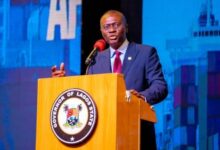President Bola Tinubu @73th birthday

For over 35 years, he has been fully associated with the struggle for a better, united and prosperous Nigeria. Sometimes, he found himself on the firing line, but often escaped being boxed into the fire.
Pragmatic, realistic, focussed and resilient, he has been consistent, reliable and dependable. Only few old politicians in the land today can boast of the same experience, adventures and battles that have shaped the political career Asiwaju Bola Ahmed Tinubu, President and Commander-In-Chief of the Nigerian Armed Forces.
As he clocks 73, he is rededicating himself to the service of his fatherland. As president of all Nigeria, he shoulders the burden and constitutional responsibility of repositioning the country across the sectors. Like he often said, he does not deserve pity, or even praise, because he voluntarily applied for the topmost job.
The President is thanking God for His mercies and renewing his hope for a better nation. He is urging Nigerians to pray for continued unity, peace and progress of Nigeria. Tomorrow is his birthday. But there is no funfair.
A special breed and national asset, Tinubu is meant for the ardous tasks in these challenging times. It is consistent with his antecedents. Either in private life as a board guru, in politics as an organiser and mobiliser, or public office as an elected official, he has been a solution centre.
He is full of boundless energy and drive as a great manager of men and resources, an astute administrator, a progressive to the core, loyal party stalwart, a detribalised leader, a bridge builder, and an apostle of national unity.
Only few governors of 1999/2007 are quite relevant till today. But Tinubu succeeded in building, nurturing and sustaining a formidable and time-tested structure, which had weathered the storm and survived the stress of political adversity.
If political scientists and other researchers on leadership beam the searchlight on the enigma, the discovery would be huge: an unrelenting spirit, audacity and sagacity, organisational acumen, boldness and bravery, determination to succeed in accomplishing difficult tasks, risk taking, discipline of mind, power of ideas, strategic thinking, focus and foresight.
Yet, his fidelity to the cherished value of friendship is legendary. So is his forgiving spirit, which is his armour. Kind-hearted and compassionate, the Jagaban Borgu is always eager to care for friends and foes alike. The President is also good at diffusing tension. He is humorous. Nothing scares him.
Many politicians want to be like the Lion of Bourdillion, who is a meticulous planner, a principled actor, visionary, a democrat, talent hunter, a philanthropist and man of the people. The question is: how many of them can afford to go through the same furnace?
Full of magnetism, he is a great debater. As he honed his skills of negotiation, consultation, persuasion, and reconciliation, they altogetherbecame invaluable assets in political relationship. Since he is willing to bow to superior arguments, Tinubu usually surrounds himself with egg heads from diverse fields. The point of departure is that he will never condone intellectual laziness and a line of action devoid of masterful logic.
A great attribute of the colourful politician is his ability to discover and mobilise talents for development. Those he has groomed for leadership roles have become vice president, governors, ministers, legislators and heads of boards and parastatals. Few of them who later betrayed or deserted him carry a great moral burden.
In 2015, Tinubu break the jinx of regional restrictions by taking. The Southwest into the mainstream politics. The move, for the first time, led to a strategic partnership that produced Gen. Muhammadu Buhari as President. The feat was repeated in 2019, with Tinubu earning the appellation of a kingmaker, godfather and benefactor.
His incisive wit and strategic thinking have always paid off in moments of grave difficulties. The difference between him and many others is that he always anticipates challenges. Although the Federal Government waged war against him when he was governor of Lagos State, he survived the hurdles. He rallied his people behind him and displayed the acumen of an effective captain. During the conflict, he ran to the temple of justice. While other governors discontinued the processs for council creation due to the fear of federal might, Tinubu said a baby already born cannot be aborted.
The former governor worked for the welfare of Lagos. He never slept on guard. Thus, while other five Southwest colleagues were swept away by the political earthquake of 2003, he became the lone survivor and the last man standing.
Since the Third Republic when he entered politics, Tinubu has been a consistent democrat and progressive who never jumped ship. As a senator, he was not a bench warmer. He challenged the military government of Ibrahim Babangida to a duel, decrying the shift of transition timetable and the criminal annulment of the June 12, 1993 presidential poll won by the late Chief Moshood Abiola.
As the transition programme midwifed by the Evil Genius crumbled, the political class ran into turbulence. Tinubu’s career as a federal legislator was later aborted by the Sani Abacha regime, which sacked the elected leadership.
He promptly joined the pro-democracy movement, the National Democratic Coalition (NADECO), to fight for democracy. It was a lost battle. By the time civil rule was restored, the symbol of the struggle, Abiola, had died mysteriously in detention. Also, in 1999, an Army General, Olusegun Obasanjo, became president.
However, Tinubu also bounced back. As Lagos governor, he presided over an administration that was a model between 1999 and 2007. He had a 24-year development plan for the transformation of the State of Aquatic Splendour. He jecked up the internally generated revenue (IGR) from N600,000 monthly to billions, boosting the chance of the state to survive without federal allocation.
Also, Tinubu fought the infrastructural battle. He constructed roads, built hospitals and schools, created opportunities for employment and re-energised the transport sector. He initiated the Bus Rapid Transit (BRT) project. The Judiciary reform he introduced was second to none. Tinubu pioneered the payment of NECO and WAEC fees for students. When Lagos allocation was seized following the creation of additional 37 council, his creative financial re-engineering made Lagos to survive.
In 2007, he had wanted to return to the Senate, but the coast was not clear. Obasanjo was still the President.
As he began his journey to mainstream politics, he first liberated the Southwest from his conservative rivals. As from 2013/14, he galvanised like-minded opposition parties to embrace the gospel of strength in unity and team spirit. A merger, the All Progressives Congress (APC), was born. It was unstoppable. The dream of the Peoples Democratic Party (PDP) to rule the country for another 60 years was aborted.
Tinubu, the National Leader and acknowledged party financier, provided selfless leadership and the quantum of resources for the novel project. This is what is lacking in the coalition of losers scheming for an imaginary and futile alliance ahead of 2027.
The road to 2023 was rough and laced with thorns. In Abeokuta, Ogun State capital, where he met delegates from the state, he thundered: “It is my turn.” He left nothing to chances.
Tinubu endured the stress of 2023 electioneering, including the unwarranted assaults by social media hoodlums. He scaled through the primary hurdle. But there was uproar when he strategically opted for the same faith ticket. He survived the vituperations.
The campaign was also tedious and energy sapping. He traversed the length and breath of the country with his manifestos, which revealed a depth of superlative knowledge of the challenges.
During the campaigns, he had to contend with the failed naira swap and inexplicable fuel scarcity??, which pitched many against him and his party.
Tinubu was mocked by unserious rivals who hired social media commentaries to malign him. He was painted as a man weighed down with age and illness. But the president-in-waiting was full of zest, agility and balance.
On poll day, while rivals appealed to ethnic and religious jingoism, Tinubu appealed to generality of Nigerians, irrespective of tribe, religion and political leaning. At the close of poll, he won in five of the six regions in a free, fair, transparent and credible election. The ‘city boy’ won the crown.
The bad losers went to court by proxy to stop him, raising eligibility questions. They crashed in the court, to the consternation of their sponsors.
The post-election battles went as far as the Supreme Court. He triumphed at last.
Right from Eagle Square, Abuja, where he was inaugurated, the nation knew where he was heading.
He confronted the subsidy barons, who wielded enormous economic influence. Since then, they have continued to fight after their initial resistance failed. The policy of subsidy removal led to hardship. But there is the assurance that Nigerians will savour the benefits in the long run.
Tinubu got the right people into the right positions. There is neither discrimination nor marginalisation of any region.
He is focused on innovation and reforms which have started yielding fruits across the critical sectors.
Unlike in the past, the President has strengthened the sub-national units with increased financial allocations. There are complaints that not all governors are judiciously utilising the funds.
The President sees the governors as partners in progress, irrespective of their party affiliations.
Tinubu has insisted on council autonomy. The goal is to foster development at the grassroots, local government being the closest to the people. Many governors are resisting this core aspect of devolution of power.
But the expected state police structure is not taking shape yet. The legislative process leading to that is slow .
The administration has resolved the long standing labour faceoff by approving N70,000 as the minimal national wage. Many states have followed suit.
The tax review has been completed and approved by the National Assembly. Now, big businessmen who evade tax has nowhere to hide.
Agriculture is receiving attention, with the development of livestock and more incentives to farmers. Food production has increased and prices are coming down.
The anti-terror was is being intensified. Terrorists are fleeing. But new groups are regrouping to reverse the gains. There is need for more intelligence gathering.
Tinubu runs an all-inclusive government that has been hailed by women and youths. Now, the National Youth Conference is taking off. It is an avenue for youths to contribute ideas to governance.
Tinubu’s intervention in Rivers State is the best. It prevented the slide into violence and chaos. The Supreme Court judgment has laid the template for impeachment of the governor by the aggrieved lawmakers. But the move would have been resisted by though guys. Already, oil pipelines were being destroyed. Bloodbath was averted by the emergency rule.
Ahead of 2027, disgruntled politicians are ganging up. They neglect the 2013/2014 merger template, opting for a short cut to failure. They neglect the spade work and wide consultations that heralded the birth of APC.
Their tactics are odd. They attack the judiciary that rescued some of them from political tribulations in the past through cheap blackmail and propaganda. Their threat is empty.
As the economy improves, the critics are disarmed. The onus is on the president to sustain the tempo and speed of economic revitalisation and recovery.
A man of history, Tinubu’s rise to fame is an act of God. He was not born into greatness; neither was greatness thrust upon him on a platter of gold. He achieved greatness through hard work, resolve, and determination. So far, he has demonstrated a huge capacity for the management of the achievements.
Born on March 29, 1952, Tinubu endured, like many others, a difficult childhood and today, he has a tale of survival to tell. His academic sojourn in the United States started in 1975 at Richard Daley College, Chicago, Illinois, where he justified himself before proceeding to Chicago State University, graduating in 1979 with a first class honours in Business Administration, specialising in Accounting and Management. In his last year, he taught the remedial tutorial classes on part-time basis. Throughout his studies, he was on the Dean’s List.
A campus politician, Tinubu was also the President of the Accounting Society in his final year. In the course of professional practice, he has traversed blue chip companies-Arthur Anderson, Deloitte Haskins, GTE Service Corporation, and Mobil Nigeria-where he was treasurer. He was a contributor to worthy social and community causes as an acclaimed philanthropist before becoming a politician of repute.
He holds the honorary chieftaincy titles of Jagaban of Borgu Kingdom, Aare of Ile-Oluji and Are-Ago of Egbaland.





